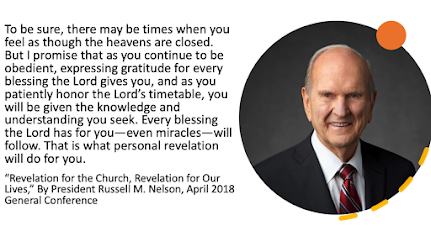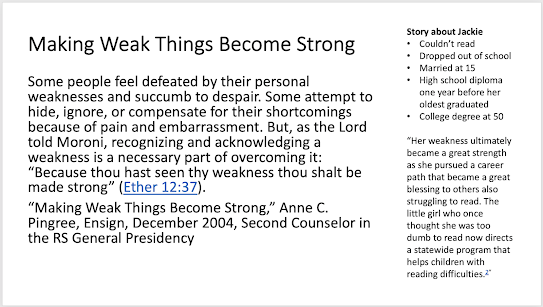This week's study from the Come Follow Me manual covered:
Doctrine and Covenants 6 - Response to Olivier Cowdery - what greater witness can you have than that of God?Doctrine and Covenants 7 - A translation from the parchment of John the discipleDoctrine and Covenants 8 - Response to Oliver Cowdery about the Spirit of RevelationDoctrine and Covenants 9 - Response to Oliver Cowdery about the calling of translating the Book of Mormon
In each of these sections, Joseph Smith went to the Lord with very specific questions, many on behalf of Oliver Cowdery. The Lord responded.
One of the things I have felt very aware of over the last couple of years is the emphasis that President Russell M. Nelson has placed on our ability and responsibility to seek personal revelation. He has shared many personal experiences with seeking revelation and he has made it clear that personal revelation is available to everyone.
In April 2018, he said:
"One of the things the Spirit has repeatedly impressed upon my mind since my new calling as President of the Church is how willing the Lord is to revel His mind and will. The privilege of receiving revelation is one of the greatest gifts of God to His Children." ("Revelation for the Church, Revelation for Our Lives," Russell M. Nelson, April 2018 General Conference)
The prophet is emphasizing something that is certainly not new. Prophets have been recording the Lord's guidance on this since the beginning of the earth, and that the Lord has re-stated this to Joseph Smith in modern revelation:
The Come Follow Me guide for Sunday School Teachers asks these questions:
1. How does the Holy Ghost speak to us?
2. How can we recognize personal revelation?
3. How can we prepare ourselves to receive personal revelation?
4. What experiences have you had with recognizing personal revelation?
5. What if it feels like the Lord isn't answering your prayers and providing personal revelation?
Each of these questions can be an entire lesson (or blog post) but I went through and looked for the answers to these questions and have some brief thoughts on each, for you to take forward in a more comprehensive personal study.
1. How does the Holy Ghost speak to us?
For those of us raised in the gospel, we learn from the time we are children that the Holy Ghost often speaks to us in a "still, small voice." Often, this can be a feeling, or a prompting, and it can be easy to doubt or ignore.
I had this experience many years ago when a woman's name came into my mind out of the blue, with no real direction. I knew this woman but we had had very little personal interaction other in recent years. I had taught one of her children as a Primary teacher many years ago and she had worked with me in a previous calling, but I doubt if we had talked to each other more than once or twice in over a year simply because we hadn't seen each other or even passed one another in the hallways at church (I was always in the Primary room). Therefore, due to lack of recent interaction, it was a surprising name to have pop into my mind. This happened maybe twice that week. I thought, "Hm, maybe this is a prompting. I'll do something nice for her soon." The following Sunday, I learned in church that she was very ill, and when I did, I also knew exactly what I could do for her. I had a specific skill set that was unique that I was able to use in a small and simple way, that she appreciated. I have always felt honored that I was given that task by the Lord.
The thing about that example, for those that feel like they never get any revelation, is that it was quite subtle, just a simple name popping into my mind with no other direction. Her name though, did dwell on my heart.
I'm currently reading, "Silent Souls Weeping," by Jane Clayson Johnson, in which she shares a story about a woman who was dealing with a period of depression and feelings of failure, when during prayer asking for help she was prompted to serve someone else. This woman said, "I was also a little angry. How could that be the answer when I was already feeling overwhelmed?" In the morning, she followed a prompting to knock on a woman's door, and the woman, answering said that when she had prayed, the Lord said, "Hang in there; Sue Clark will call in the morning." This isn't an example about doing more than you feel capable of, it's about listening to quiet feelings and impressions. The Lord understands things that we don't and helping Sue Clark helped her.
2. How can we recognize personal revelation?
In the same General Conference talk I referenced earlier, President Nelson said (click to make larger):
I love that guidance that we can grow into the principle of revelation as we practice listening and writing down the thoughts that come to our mind.
I keep a notebook just for writing down promptings. As I study scriptures, prayer, and ponder, I write down thoughts that come to my mind. Sometimes I wake up in the morning from a dream or have a thought right when I wake up, or as I'm falling asleep, and I keep my notebook nearby to write those down too. Not all thoughts are promptings to do something but as I practice this principle, I like knowing that I am "growing in the principle of revelation."
3. How can we prepare ourselves to receive personal revelation?
The Lord reveals his answer to Oliver Cowdery through Joseph Smith. When I read this, I think of the phrase, "Faith without works is dead." A little analogy: I once had someone tell me about how they prayed that the Lord would wake them up at a certain time before laying down to take a nap. While this faith is commendable, I think the Lord would have appreciated it if they set their alarm clock, too!
(Click to enlarge)
The advice the Lord gives Oliver Cowdery on answer to pray is actually quite similar to what we learn in more advanced careers in the work field. A junior person might say, "Hey manager, there's a problem. How will you fix it for me?" (They are not going to get promoted anytime soon this way.) In an advanced field, with advanced skill sets, the employee would say, "Hey manager, there's a problem. I have looked at the possible solutions, and there are three. I will present them to you all here. I believe that solution C is the best approach. Do you agree/support me?" See the difference? If there's only one right way to do things, the Lord may "cause that your bosom shall burn within you" when you correctly choose "C." If all the answers are good, he may leave you to it to decide which solution you recommend. It may be as simple as that you don't get a bad feeling about any of the possible solutions. This is just my own little analogy but the point is, that we have to prepare.
As President Nelson mentioned in the quote earlier, that means also finding a quiet place, humbling ourselves, and sincerely talking to the Lord.
4. What experiences have you had with recognizing personal revelation
I've already shared one of my experiences so I'll leave it that for now but I do want to re-state this question so you can think about it. I know this can be a sensitive topic for some that don't feel like they hear personal revelation as clearly as others but it may be more about recognizing it, sometimes, which is a skill that you work on!
President Nelson said, "I urge you to stretch beyond your current spiritual ability to receive personal revelation, for the Lord has promised that 'if thou shalt [seek], thou shalt receive revelation upon revelation, knowledge upon knowledge, that thou mayest know the mysteries and peacable things - that which bringeth joy, that which bringeth life eternal." ("
Revelation for the Church, Revelation for Our Lives," Russell M. Nelson, April 2018 General Conference)
Sheri Dew, then the second counselor in the Relief Society General Presidency, and speaking at a Women's session of General Conference said:
"It is vital that we, the sisters of Relief Society, learn to hear the voice of the Lord. Yet I worry that too often we fail to seek the guidance of the Spirit. Perhaps we don’t know how and haven’t made it a priority to learn. Or we’re so aware of our personal failings that we don’t feel worthy, don’t really believe the Lord will talk to us, and therefore don’t seek revelation. Or we’ve allowed the distractions and pace of our lives to crowd out the Spirit. What a tragedy! For the Holy Ghost blesses us with optimism and wisdom at times of challenge that we simply cannot muster on our own." ("We are Not Alone," Sheri Dew, November 1998 General Conference)
5. What if it feels like the Lord isn't answering your prayers / providing personal revelation?
(Again, click to enlargen).
I wish I could put all of the thoughts I have about revelation into this post but I think the thing I want to end with is that it is available to everyone, everywhere. You don't have to be a baptized member of my faith. The restored gospel of Jesus Christ started with Joseph Smith reading James 1:5, and learning that he had the privilege of praying to Heavenly Father. We grow in our abilities to talk to the Lord and hear the Lord's responses as we faithfully practice and develop our relationship with him. I'm so grateful for a Father in Heaven that wants to hear from us and wants to help us!







































